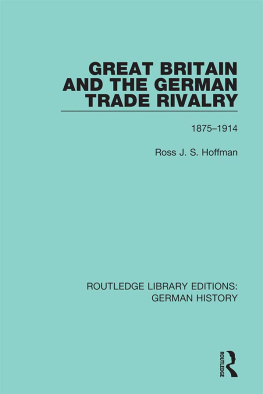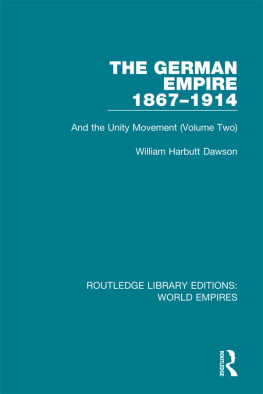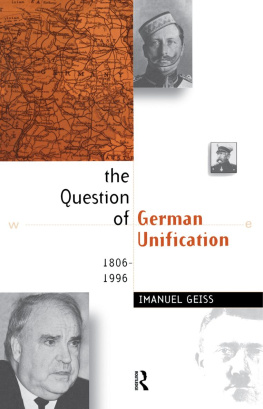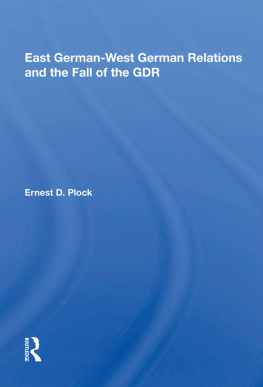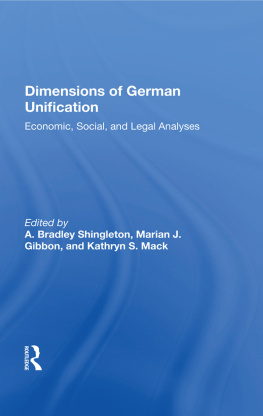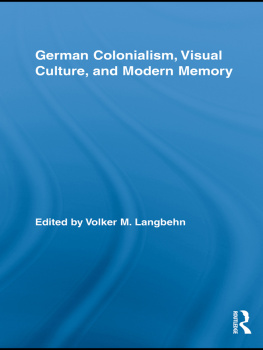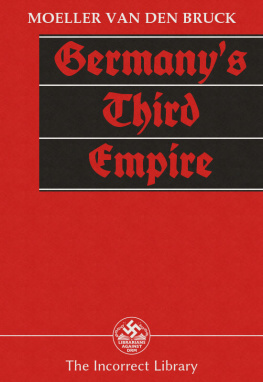ROUTLEDGE LIBRARY EDITIONS:
GERMAN HISTORY
Volume 9
FROM UNIFICATION TO NAZISM
FROM UNIFICATION TO NAZISM
Reinterpreting the German Past
GEOFF ELEY
First published in 1986 by Unwin Hyman
This edition first published in 2020
by Routledge
52 Vanderbilt Avenue, New York, NY 10017
and by Routledge
2 Park Square, Milton Park, Abingdon, Oxon OX14 4RN
Routledge is an imprint of the Taylor & Francis Group, an informa business
1986 Geoff Eley
All rights reserved. No part of this book may be reprinted or reproduced or utilised in any form or by any electronic, mechanical, or other means, now known or hereafter invented, including photocopying and recording, or in any information storage or retrieval system, without permission in writing from the publishers.
Trademark notice: Product or corporate names may be trademarks or registered trademarks, and are used only for identification and explanation without intent to infringe.
British Library Cataloguing in Publication Data
A catalogue record for this book is available from the British Library
ISBN: 978-0-367-02813-8 (Set)
ISBN: 978-0-429-27806-8 (Set) (ebk)
ISBN: 978-0-367-23092-0 (Volume 9) (hbk)
ISBN: 978-0-429-27831-0 (Volume 9) (ebk)
Publishers Note
The publisher has gone to great lengths to ensure the quality of this reprint but points out that some imperfections in the original copies may be apparent.
Disclaimer
The publisher has made every effort to trace copyright holders and would welcome correspondence from those they have been unable to trace.
FROM UNIFICATION TO NAZISM
Reinterpreting the German Past
GEOFF ELEY
Geoff Eley, 1986
This book is copyright under the Berne Convention. No reproduction
without permission. All rights reserved.
Unwin Hyman Inc.
955 Massachusetts Avenue, Cambridge, MA 02139, USA
Published by the Academic Division of
Unwin Hyman Ltd
15/17 Broadwick Street, London W1V 1FP, UK
Allen & Unwin (Australia) Ltd
8 Napier Street, North Sydney, NSW 2060, Australia
Allen & Unwin (New Zealand) Ltd
in association with the Port Nicholson Press Ltd
Compusales Building, 75 Ghuznee Street, Wellington 1, New Zealand
First published in 1986
Second impression 1990
Library of Congress Cataloging in Publication Data
Eley, Geoff, 1949
From unification to Nazism.
Includes index
1. German History 18481870. 2. German History 1871
I. Title.
DD210.E48 1985 943.08 85-11183
ISBN 0-04-943039-4 (pbk.: alk. paper)
British Library Cataloguing in Publication Data
Eley, Geoff
From unification to Nazism: reinterpreting the German past.
1. Germany History 18661871 2. Germany History 1871
I. Title
943.08 DD210
ISBN 0-04-943039-4 Pbk
Set in 10 on 12 point Garamond by Fotographics (Bedford) Ltd and printed in Great Britain by
Mackays of Chatham
Contents
Of the contents of this collection, the Introduction has been specially written, and are previously unpublished. Of the rest, the original places of publication were as follows:
: Historical Journal, vol. 21, no. 3 (1978), pp. 73750.
: Raphael Samuel and Gareth Stedman Jones (eds), Culture, Ideology and Politics. Essays for Eric Hobsbawm (London: Routledge & Kegan Paul, 1983), pp. 277301.
: Militargeschichtliche Mitteilungen, vol. 15 (1974), pp. 2963.
: Joachim Radkau and Imanuel Geiss (eds), Imperialismus im 20. Jahrhundert. Gedenkschrift fur Georg W. F. Hallgarten (Munich: Verlag C. H. Beck, 1976), pp. 7186.
: Radical History Review, no. 2830 (1984), pp. 1344.
: East European Quarterly, vol. 18, no. 3 (1984), pp. 33564.
: Richard J. Evans (ed.), Society and Politics in Wilhelmine Germany (London: Croom Helm, 1978), pp. 11235.
: Politics and Society, vol. 12, no. 1 (1983), pp. 5382.
Taken as a whole, these essays try to develop a particular way of approaching the German past between Bismarck and Hitler, which is at some variance with how German history has mainly been written since the Second World War. They were written at various times over the last ten years, the oldest as long ago as 1973, some as recently as 1983. Most have been published before, with varying degrees of accessibility. My purpose in bringing them together is to revive some of their arguments and to set them before a larger public than is sometimes the case with articles published in specialized journals. Because they represent instalments of a larger plan, reflecting aspects of a general vision of the German past, I also believe that they make a relatively coherent collection. Quite aside from the merits of the individual essays, therefore, this is the basis on which I would like the volume to be judged.
In this sense, the essays follow several different lines of inquiry. One concerns the best way of conceptualizing the continuity in German history if we are to do justice both to the origins of Nazism and to the autonomies of the imperial period that came before. Another concerns what has become the abiding problem of historical analysis in the last third of the twentieth century, namely the best way of relating the economic and social-structural levels of a societys existence to the political, cultural and ideological ones, or to put it another way, the best way of integrating different kinds of history together in a comprehensive view of the whole. Yet a third is focused more closely on some particular areas of German historical writing, including the impact of the Great Depression of 187396, the weaknesses of German liberalism, the pivotal importance of 18789 and 18971902 to the empires political history, the extent of the SPDs radicalism as opposed to its degree of integration in imperial German society, and so on.
It will not escape the readers attention that these arguments are explored via the medium of critique. My work in German history has been conducted through a kind of running dialogue with existing approaches in the field. This began with the first of my published articles (
Amongst German historians, it is fair to say, this critique has not enjoyed unqualified assent. Some of its aspects have been extremely contentious, provoking widespread disagreement (particularly in the Federal Republic of Germany) and considerable unease, even in circles inclined to be sympathetic. This is partly a matter of generations. Since the war, Anglo-American writing about Germany has been dominated by people who directly experienced the horrors of Nazism in their own lives, intellectual development and moral-political formation, often as a result of growing up in Germany itself and the ensuing traumas of personal loss and forced emigration, and invariably through some form of participation in the anti-fascist war effort.
This way of thinking received decisive further impetus from developments in West Germany in the 1960s. Apart from the early advocates of contemporary history (amongst whom Bracher was a leading voice), few historians in the Federal Republic had joined the Anglo-American liberal critique until the way was opened by the celebrated Fischer Controversy surrounding the work of the Hamburg historian Fritz Fischer on Germanys aims in the First World War. This is not the place for another detailed commentary on the ramifications of this affair. We need only to note that it dramatically exposed the problem of continuity in modern German history for intensive discussion. By showing similarities between German expansionism in both world wars, Fischer both located Nazism in the deeper German past and directed attention to the social factors that may have produced it. Interest quickly focused on the social and political system of the


